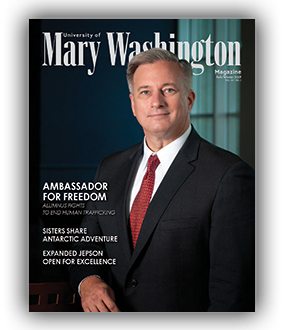
Cathe Cantwell Luria retired in 2013 as a nurse practitioner but still embraces a life of public service and adventure.
After enduring four decades of gray, cold winters in Washington state, Catherine “Cathe” Cantwell Luria ’66 is soaking up the sun at her home in Ajijic, Mexico. Luria, a retired nurse practitioner, and her husband, retired physician Eric Luria, visited friends in Ajijic several winters before deciding in fall 2016 to move to this idyllic community on Mexico’s Lago de Chapala.
“It’s a beautiful small community, and the weather is fantastic,” Luria said. She doesn’t miss the gray skies and rain that characterized nine months of the year in her old home of Gig Harbor, Washington. “Here, it’s sunny most days. It’s just a gorgeous setting.”
Since arriving in Ajijic (pronounced ah-hee-HEEK), Luria has enjoyed voice lessons, Spanish classes, and singing with a community chorus. She’s also supported the Lake Chapala chapter of Days for Girls, an international nonprofit that distributes environmentally friendly menstruation supplies for girls and educates women and men about reproductive health, hygiene, domestic abuse, and the importance of safe relationships.
Luria covered those topics and plenty more with her patients over the years. She majored in chemistry and minored in biology at Mary Washington with an intent to study medicine. In between classes – including French with Professor Juliette Breffort Blessing for four years – Luria played flute in Mary Washington’s orchestra, served as vice president of Trench Hill dorm, helped revise the SGA student handbook each year, and competed in backstroke on the swim team.
Very few women were accepted into medical school in those days, Luria said. But when her mother shared with her an article in The New York Times about a brand-new master’s program at the New York Medical College Graduate School of Nursing, Luria applied; she earned a Master of Science in Nursing degree in 1968. The program was among the country’s first to promote more autonomy among nurses, a concept that caught on more rapidly in the early 1970s with a push to allow nurse practitioners to serve as primary care providers.
“We were really on the cutting edge,” the Hobart, New York, native recalled. “It was a heady time.”
With her master’s degree in hand, Luria worked as a public health nurse for five years in Rochester, New York. There, in addition to meeting her husband, Luria worked at a publicly funded neighborhood health clinic. She and the rest of the staff were charged with developing a new role for the public health nurse, one more akin to that of the nurse practitioner.
“It was a time of constant evolution of our role and work,” she said. “Without the four years at the health center, none of the rest of my career would have been possible.”
Luria and her husband then spent a year at the University of Kentucky, where he interned and she taught pediatric nursing, before serving the Native American population in Gallup, New Mexico, for a year. The adventurous couple then headed to Kotzebue, Alaska, above the Arctic Circle, where patients from 10 small villages traveled to the hospital by plane and snowmobile. The couple used shortwave radios to dispense advice to far-flung health aides, Luria said, and she delivered babies as part of this remote assignment.
“You just learned all kinds of things you’d never learn in the lower 48.”
In the late 1970s, the Lurias moved to Tacoma, Washington, where they ran a satellite clinic for a fledgling health maintenance organization before establishing their family practice in Gig Harbor in 1979. The state legislature had passed a law allowing nurse practitioners to prescribe medication, and – after working for several years with the Nursing Commission to draft regulations around the law – Luria became the first nurse practitioner in the state with that authority. Luria also worked cooperatively with local therapists, encouraging her patients to care for their mental health as much as their physical health and promoting a holistic approach to healthcare.
“You could get your Pap smear and your antidepressants in the same place,” said Luria, who retired in 2013. “I loved it.”
Now she loves her life in Ajijic, where her Spanish-speaking skills are improving. But she could only live there knowing she could regularly fly to Portland, Oregon, to see her daughter, Sacha, son-in-law, Ryan, and three grandchildren, who Skype with her between visits.
“If I get a ‘Mommy, come’ call,” she said, “I go.”
